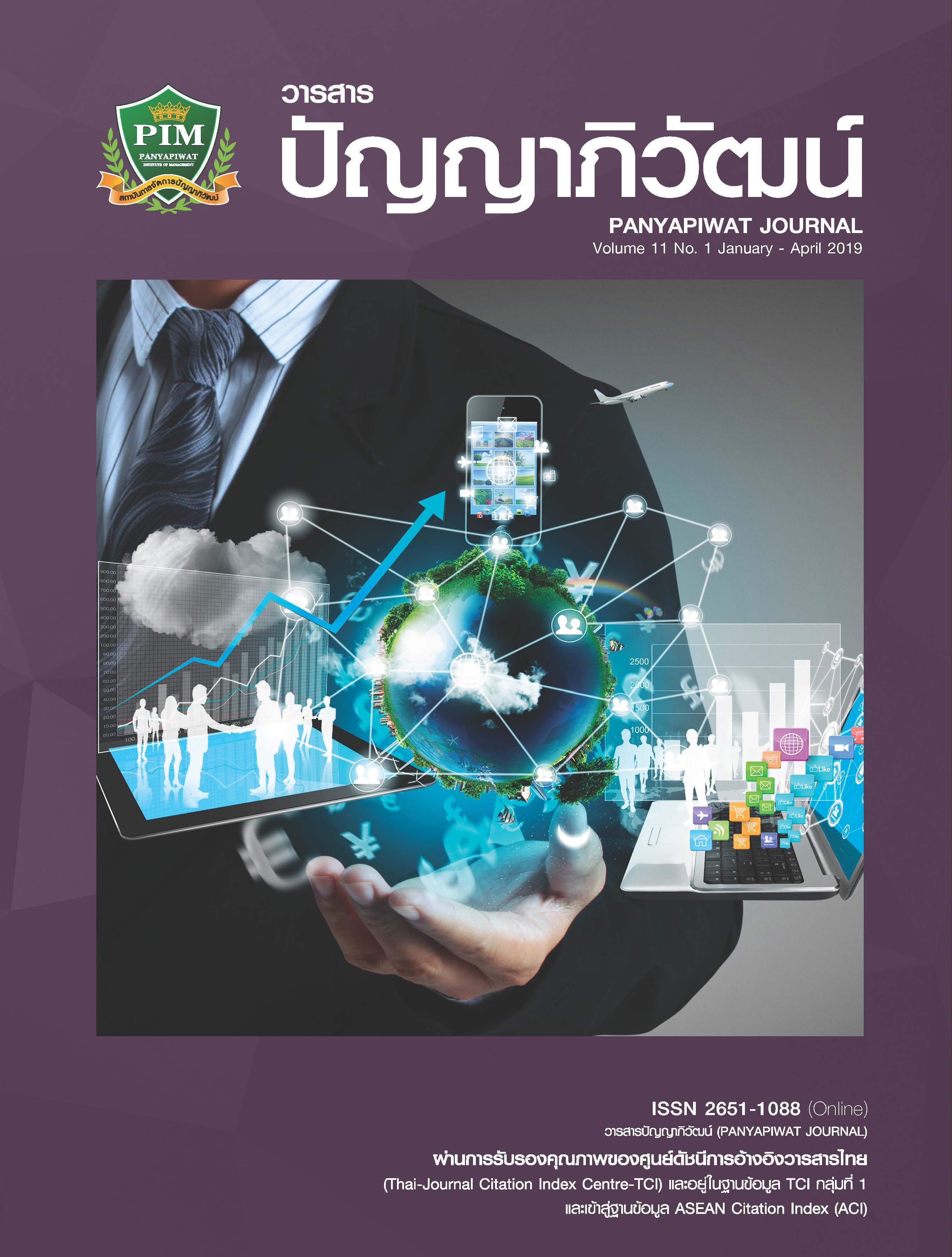FACTORS OF SOCIAL ACCOUNTING IMPLEMENTATION OF LISTED FIRMS IN THAILAND
Main Article Content
บทคัดย่อ
การเติบโตทางเศรษฐกิจและภาคอุตสาหกรรมที่รวดเร็วนำมาพร้อมซึ่งผลกระทบต่อสังคมและสิ่งแวดล้อม ดังนั้นกิจการจึงต้องแสดงออกถึงความรับผิดชอบต่อการดำเนินงานใดๆ ที่ส่งผลกระทบเหล่านั้น ด้วยเหตุนี้จึงได้นำการประยุกต์ใช้การบัญชีสังคมมาเป็นเครื่องมือการบริหารเชิงกลยทุธ์ของกิจการที่จะช่วยสื่อสารและรายงานข้อมูล
ความรับผิดชอบต่อสังคมและสิ่งแวดล้อมไปยังผู้มีส่วนได้เสีย จึงเป็นที่น่าสนใจว่ามีปัจจัยใดบ้างที่ผลักดันและส่งเสริมกลยุทธ์นี้ การศึกษานี้เป็นการวิจัยเชิงปริมาณใช้แบบสอบถามเป็นเครื่องมือวิจัยเพื่อรวบรวมข้อมูล มีวัตถุประสงค์เพื่อศึกษาปัจจัยที่ส่งผลกระทบต่อการประยุกต์ใช้การบัญชีสังคมของบริษัทจดทะเบียนในตลาดหลักทรัพย์แห่งประเทศไทย (SET) ซึ่งประกอบด้วยปัจจัยภายใน ได้แก่ วิสัยทัศน์ขององค์กรในระยะยาว ความตระหนักถึงการกำกับดูแลกิจการและวัฒนธรรมที่มุ่งเน้นตามหลักจริยธรรม รวมถึงปัจจัยภายนอก ได้แก่ การเปลี่ยนแปลงการแข่งขันอย่างต่อเนื่อง และความกดดันจากความคาดหวังของตลาด ประชากรกลุ่มตัวอย่างคือ บริษัทจดทะเบียนในตลาดหลักทรัพย์แห่งประเทศไทย (SET) ได้รับการตอบแบบสอบถามกลับมาจำนวน 121 บริษัท ผลการวิจัยพบว่า ความตระหนักถึงการกำกับดูแลกิจการ และวัฒนธรรมที่ม่งุ เน้นตามหลักจริยธรรมมีผลกระทบเชิงบวกต่อการประยุกต์ใช้การบัญชีสังคมทั้งสองปัจจัยข้างต้นสะท้อนให้เห็นว่า กิจการมีความตระหนักและจิตสำนึกมีความรับผิดชอบซึ่งเป็นแรงผลักดันภายในที่สำคัญในการขับเคลื่อนการประยุกต์ใช้การบัญชีสังคม
Article Details
“ข้าพเจ้าและผู้เขียนร่วม (ถ้ามี) ขอรับรองว่า บทความที่เสนอมานี้ยังไม่เคยได้รับการตีพิมพ์และไม่ได้อยู่ระหว่างกระบวนการพิจารณาลงตีพิมพ์ในวารสารหรือแหล่งเผยแพร่อื่นใด ข้าพเจ้าและผู้เขียนร่วมยอมรับหลักเกณฑ์การพิจารณาต้นฉบับ ทั้งยินยอมให้กองบรรณาธิการมีสิทธิ์พิจารณาและตรวจแก้ต้นฉบับได้ตามที่เห็นสมควร พร้อมนี้ขอมอบลิขสิทธิ์บทความที่ได้รับการตีพิมพ์ให้แก่สถาบันการจัดการปัญญาภิวัฒน์หากมีการฟ้องร้องเรื่องการละเมิดลิขสิทธิ์เกี่ยวกับภาพ กราฟ ข้อความส่วนใดส่วนหนึ่งและ/หรือข้อคิดเห็นที่ปรากฏในบทความข้าพเจ้าและผู้เขียนร่วมยินยอมรับผิดชอบแต่เพียงฝ่ายเดียว”
เอกสารอ้างอิง
Ali, R., Lynch, R., Melewar, T. C. & Jin, Z. (2015). The moderating in fluences on the relationship of corporate reputation with its antecedents and consequences: A meta-analytic review. Journal of Business Research, 68(5), 1105-1117.
Anas, A., Abdul Rashid, H. M. & Annuar, H. A. (2015). The effect of award on CSR disclosures in annual reports of Malaysian PLCs. Social Responsibility Journal, 11(4), 831-852.
Armstrong, J. S. & Overton, T. S. (1977). Estimating nonresponse bias in mail surveys. Journal of Marketing, 14(3), 396-402.
Chadegani, A. A. & Jari, A. (2016). Corporate ethical culture: Review of literature and introducing PP model. Procedia Economics and Finance, 36(16), 51-61.
Chen, T., Tribbitt, M. A., Yang, Y. & Li, X. (2017). Does rivals’ innovation matter? A competitive dynamics perspective on frms’ product strategy. Journal of Business Research, 76, 1-7.
Cho, E., Chun, S. & Choi, D. (2015). International diversifcation, corporate social responsibility, and corporate governance: Evidence from Korea. The Journal of Applied Business Research, 31(2), 743-764.
Cormier, D. & Magnan, M. (2014). The impact of social responsibility disclosure and governance on fnancial analysts’ information environment. Corporate Governance: The International Journal of Business in Society, 14(4), 467-484.
Corporate Social Responsibility Institute. (2012). Corporate social responsibility for corporate sustainability. Bangkok: ID All Digital Print.
Darus, F., Mad, S. & Nejati, M. (2015). Ethical and social responsibility of fnancial institutions: influence of internal and external pressure. Procedia Economics and Finance, 28, 183-189.
Emeseh, E. & Songi, O. (2014). CSR, human rights abuse and sustainability report accountability. International Journal of Law and Management, 56(2), 136-151.
Ertop, D. (2015). Business ethics, corporate social responsibility and importance of implementation of CSR at corporations. International Journal of Contemporary Applied Sciences, 2(12), 37-61.
Fernandez-Kranz, D. & Santalo, J. (2010). When necessity becomes a virtue: The effect of product market competition on corporate social responsibility. Journal of Economics and Management Strategy, 19(2), 453-487.
Gallhofer, S., Haslam, J. & van der Walt, S. (2011). Critical perspectives on accounting accountability and transparency in relation to human rights: A critical perspective reflecting upon accounting, corporate responsibility and ways forward in the context of globalisation. Critical Perspectives on Accounting, 22(8), 765-780.
Giménez Leal, G., Fa, M. C. & Pasola, J. V. (2003). Using environmental management systems to increase frms’ competitiveness. Corporate Social Responsibility and Environmental Management, 10(2), 101-110.
Golob, U. & Bartlett, J. L. (2007). Communicating about corporate social responsibility: A comparative study of CSR reporting in Australia and Slovenia. Public Relations Review, 33(1), 1-9.
Gray, R. (2002). The social accounting project and accounting organizations and society. Privileging engagement, imaginings, new accountings and pragmatism over critique? Accounting, Organizations and Society, 27(7), 687-708.
Hair, J. F., Black, W. C., Babin, B. J. & Anderson, R. E. (2010). Multivariate Data Analysis: A global perspective (7th ed.). New Jersey: Pearson Education.
Hoque, Z. (2011). The relations among competition, delegation, management accounting systems change and performance: A path model. Advances in Accounting, 27(2), 266-277.
Husted, B. W. (2000). A contingency theory of corporate social performance. Business and Society, 39(1), 24-48.
Jondle, D., Ardichvili, A. & Mitchell, J. (2014). Modeling ethical business culture: development of the ethical business culture survey and its use to validate the CEBC model of ethical business culture. Journal of Business Ethics, 119(1), 29-43.
Kasemsuk, C. (2016). Corporate social responsibility approach to sustainable business. Panyapiwat Journal, 8(2), 261-271. [in Thai]
Killian, S. & O’Regan, P. (2016). Social accounting and the co-creation of corporate legitimacy. Accounting, Organizations and Society, 50, 1-12.
Kumari, P. & Pattanayak, J. K. (2013). Impact of corporate governance on level of earnings management and overall frm performance: A review. International Journal of Financial Management, 4(1), 82-95.
Liesen, A., Hoepner, A. G., Patten, D. M. & Figge, F. (2015). Does stakeholder pressure influence corporate GHG emissions reporting? Empirical evidence from Europe. Accounting, Auditing & Accountability Journal, 28(7), 1047-1074.
Liu, X. & Zhang, C. (2017). Corporate governance, social responsibility information disclosure, and enterprise value in China. Journal of Cleaner Production, 142, 1075-1084.
Lounkaew, K. (2017). How do businesses adapt in the era of Thailand 4.0? Retrieved January 1, 2018, from https://www.bangkokbiznews.com/blog/detail/641225
McWilliams, A. & Siegel, D. S. (2010). Creating and capturing value: strategic corporate social responsibility, resource-based theory, and sustainable competitive advantage. Journal of Management, 37(5), 1480-1495.
Michelon, G. & Parbonetti, A. (2012). The effect of corporate governance on sustainability disclosure. Journal of Management & Governance, 16(3), 477-509.
Moura-leite, R. C., Padgett, R. C. & Galan, J. I. (2012). Is social responsibility driven by industry or frm-specifc factors? Management Decision, 50(7), 1200-1221.
Persiè, A. & Markiè, M. (2013). The impact of social responsibility vision and strategy on successful corporate operations. Managing Global Transitions, 11(1), 27-40.
Qian, W., Burritt, R. & Monroe, G. (2011). Environmental management accounting in local government. Accounting, Auditing and Accountability Journal, 24(1), 93-128.
Rahimnia, F., Moghadasian, M. & Mashreghi, E. (2011). Application of grey theory approach to evaluation of organizational vision. Grey Systems: Theory and Application, 1(1), 33-46.
Saeidi, S. P., Sofan, S., Saeidi, P., Saeidi, S. P. & Saaeidi, S. A. (2015). How does corporate social responsibility contribute to frm fnancial performance? The mediating role of competitive advantage, reputation, and customer satisfaction. Journal of Business Research, 68(2), 341-350.
Suttipun, M. & Nuttaphon, C. (2014). Corporate social responsibility reporting on websites in Thailand. Kasetsart Journal-Natural Science, 35(3), 536-549.
Tengblad, S. & Ohlsson, C. (2010). The framing of corporate social responsibility and the globalization of national business systems: A longitudinal case study. Journal of Business Ethics, 93(4), 653-669.
Young, S. & Thyil, V. (2014). Corporate social responsibility and corporate governance: Role of context in international settings. Journal of Business Ethics, 122(1), 1-24.


